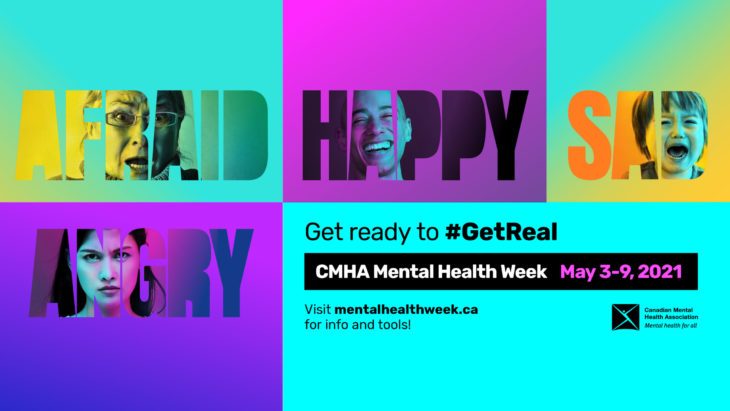For Mental Health Week, name how you feel. Don’t numb it.

It is CMHA’s 70th Mental Health Week, and this year we took the pulse of Canada’s emotions and found that the pandemic has taken its toll. This according to the latest round of research from CMHA and UBC researchers, which found that 77% of adults report feeling ‘worried or anxious,’ ‘bored,’ ‘stressed,’ ‘lonely or isolated’ and ‘sad’.
These difficult feelings may, in fact, be a fitting emotional response to these difficult times.
Margaret Eaton, National CEO of CMHA, sees it this way: “While it’s discouraging to think that so many Canadians are feeling upset, difficult emotions may actually be an appropriate response to a major event like a global pandemic.”
Contrary to what might be popular belief, good mental health isn’t about being happy all the time. In fact, lead researcher on the study, Emily Jenkins, a UBC professor who studies mental health and substance use, tells us that good mental health is about having “appropriate emotional and behavioural responses to stressors and life events,” Dr. Jenkins says it is important to acknowledge and process emotions, not to hide them. “Sharing our very normal feelings of sadness, fear and worry is particularly important during this unusual time of stress, uncertainty and loss.”
So while emotions are running high, this Mental Health Week offers a chance to put our feelings front and centre in the interest of our mental health. That’s because claiming how we feel not only makes sadness, anger and worry less intense, it can also make us feel better. And it can make it easier to manage our emotions, and easier to connect emotionally with others.
There’s brain science behind this too. Research shows that putting your negative emotions into words disrupts and reduces activity in the amygdala, the part of the brain that drives responses to stress and fear. Having a specific label for a feeling increases activity in the prefrontal and temporal regions of the brain. The act of naming our emotions can actually help us feel calmer and help us understand what we’re going through.[1]
However, it is important to recognize when difficult feelings are too much. If intense worry, anxiety or despair are disrupting your life or your relationships, or you are relying on substances to cope, it’s important to seek help.
This Mental Health Week, people across Canada will get #GetReal by naming—not numbing—how they feel.
To get involved in Mental Health Week, you can:
- Learn more about mental health and emotions at mentalhealthweek.ca
- Share your support on social media by downloading a toolkit and using hashtags #GetReal and #MentalHealthWeek
- Donate to support CMHA mental health programs and services at cmha.ca/donate
- Connect. If you or someone you love is struggling, please contact your local CMHA or visit the Government of Canada’s Wellness Together portal. If you are in crisis, please call 1-833-456-4566 toll free in Canada (1-866-277-3553 in Quebec) or dial 911.

